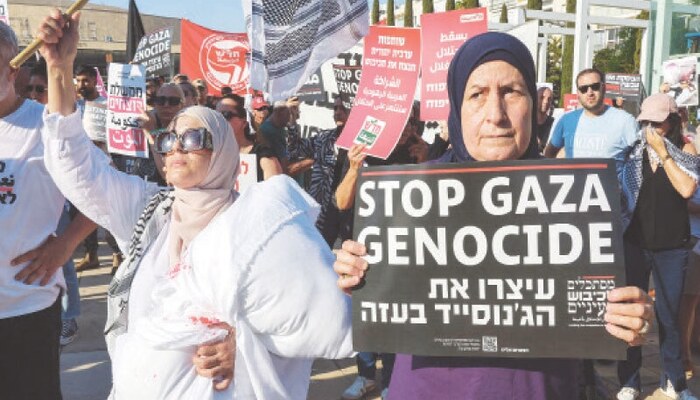Gaza Famine Sparks Rage, Palestinians: UN Warning Came Late

The keyword Gaza famine has ignited global concern after the United Nations officially declared famine in the besieged territory. But for Palestinians, the declaration brought frustration rather than relief. Families struggling daily for food and shelter said the warning arrived “far too late,” as hunger and devastation already consume their lives.
Scramble for Survival in Gaza City
In Gaza City, scenes of desperation unfolded outside charity kitchens. Women, men, and children crowded with pots and plastic buckets, pushing through the chaos for a small serving of rice. A young boy scooped leftover grains directly from the edge of a cooking pot. Nearby, a girl sat beside a makeshift tent, eating rice from a plastic bag on the ground.
Displaced residents said they had lost everything. “We have no home left, no food, no income. We turn to charity kitchens, but even they cannot satisfy our hunger,” said 58-year-old Yousef Hamad, forced to flee from Beit Hanoun in northern Gaza.
‘Far Too Late’
South of Gaza City, in Deir el Balah, 34-year-old Umm Mohammad expressed anger at the UN’s famine declaration. “It came far too late,” she said. “The children are staggering from dizziness, unable to wake up because they lack food and water.” Her words reflected the worsening reality for families enduring nearly two years of conflict.
UN Report and Accusations
On Friday, the UN confirmed famine in Gaza, citing the “systematic obstruction” of aid deliveries by Israel. The Rome-based Integrated Food Security Phase Classification (IPC) said famine was already hitting 500,000 people in Gaza governorate, which includes Gaza City.
The IPC further warned that famine conditions would likely spread to Deir el Balah and Khan Yunis by the end of September, engulfing nearly two-thirds of Gaza’s population.
In response, Israeli Prime Minister Benjamin Netanyahu dismissed the UN findings as “an outright lie.” But the head of the UN Relief and Works Agency (UNRWA), Philippe Lazzarini, countered on Saturday, stating, “It is time for the government of Israel to stop denying the famine it has created in Gaza.” He urged world leaders to act with “determination and a sense of moral duty.”
Read: X Users Highlight Gaza Crisis as Schools Collapse
Relentless Strikes on Gaza City
Even as famine looms, Israeli bombardments have intensified. Thick plumes of smoke rose above Gaza City’s Zeitoun district as residents picked through rubble left by fresh airstrikes.
Mahmud Bassal, spokesman for Gaza’s civil defence, described the situation in Sabra and Zeitoun neighborhoods as “absolutely catastrophic.” He said entire residential blocks had been leveled, leaving thousands displaced yet again.
“We are trapped here, living in fear, with nowhere to go. There’s no safety anywhere in Gaza,” said Ahmad Jundiyeh, 35, who had been displaced to Zeitoun’s outskirts. “Everywhere we hear bombing, jets, artillery, drones. It feels like the end is near.”
Israel’s Warning
Israel’s Defence Minister Israel Katz declared on Friday that Gaza City would face total destruction if Hamas refused to disarm, release all remaining prisoners, and accept Israel’s conditions to end the war. The warning echoed across the city, fueling panic among residents already fleeing relentless strikes.
“Let them come and see what has become of us,” said 53-year-old Aymen Daloul, whose house was destroyed in the bombing. “We sleep on the streets like cattle. Have mercy on us.”
Exodus of Families
The threat of invasion has sparked mass displacement. Thousands of families are leaving Gaza City every day, fearing another large-scale military assault.
“Just this morning, more than 500 to 600 families left, and yesterday thousands left,” said Mahmud Abu Saqer, 24. “Everyone is terrified of what is coming next.”
Families pack what little they can carry—blankets, jugs of water, a few clothes—and head south on dangerous routes, uncertain where safety lies. The exodus underscores the deepening humanitarian collapse.
Humanitarian Crisis Deepens
The combination of hunger, displacement, and bombardment paints a grim picture of life in Gaza. Families wait hours for a single meal from overstretched charity kitchens. Hospitals, already overwhelmed, struggle to care for malnourished children alongside war wounded. Aid agencies warn that even if food enters Gaza in greater volumes, the damage has already been catastrophic.
UN officials argue that international action is urgently needed to prevent famine from spreading across the entire territory. But with Israel continuing its blockade and military operations, access to food, medicine, and clean water remains limited.
Voices from the Ground
For Palestinians, the famine declaration was less a warning than a confirmation of what they have lived for months. Their testimonies highlight the raw struggle for survival.
“We hear about reports and statements, but none of them fill our children’s stomachs,” said Umm Mohammad in Deir el Balah. “We are left to watch them collapse from hunger.”
Meanwhile, fathers like Yousef Hamad cling to hope that aid might arrive in time. “We have no choice but to keep waiting and searching for food,” he said. “Every day is about survival.”
A Territory on the Brink
The Gaza famine is no longer a looming threat but a harsh reality for hundreds of thousands. With food scarce, homes destroyed, and bombardments ongoing, life in the territory has reached breaking point.
As Israel insists on continuing its offensive and Palestinians struggle under hunger and displacement, international pressure builds. The coming weeks will determine whether famine spreads further—or whether the world acts before Gaza plunges into an even deeper humanitarian abyss.
Follow us on Instagram, YouTube, Facebook,, X and TikTok for latest updates
